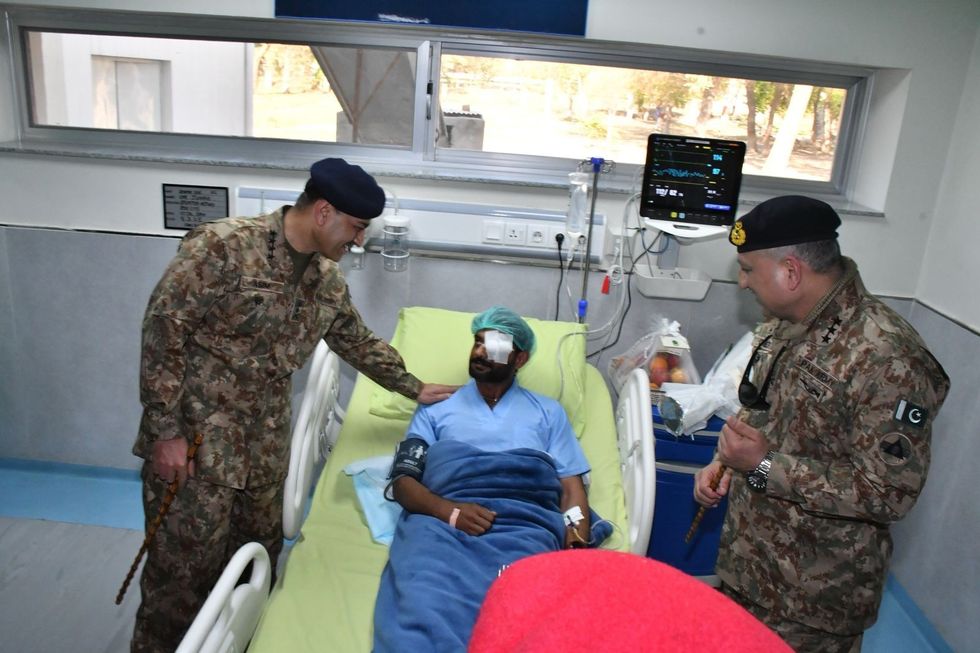Pakistan army chief accuses Afghanistan of harboring militants behind Bannu attack
General Munir cited foreign weapons as evidence of Afghanistan providing sanctuary to terrorists
News Desk
The News Desk provides timely and factual coverage of national and international events, with an emphasis on accuracy and clarity.

Pakistan's Chief of Army Staff Gen. Syed Asim Munir meets troops in Bannu, Pakistan, Thursday, March 6, 2025, following a deadly militant attack.
ISPR
1,081 terrorism deaths occurred in Pakistan in 2024, a 45% increase from 2023
Militant group Jayesh Fursan Muhammad claimed responsibility for the attack
Pakistan now ranks as second most terrorism-affected country worldwide
Pakistan's top military commander on Thursday directly accused neighboring Afghanistan of providing sanctuary to militants who carried out this week's deadly attack on an army base, escalating tensions between the two countries as Pakistan grapples with surging terrorism.
Chief of Army Staff General Syed Asim Munir said that the use of foreign weapons and equipment in Tuesday's attack on Bannu Cantonment was "clear evidence that Afghanistan remained a safe haven" for terrorist groups targeting Pakistan, according to a statement issued by military's media wing, the Inter-Services Public Relations (ISPR).
"Terrorist groups, including Fitna Al-Khawarij, continued to operate from Afghan soil against Pakistan," Munir said during a visit to Bannu, the site of Tuesday's attack that killed 18 people, including five soldiers and 13 civilians.
The army chief's comments come as a new global terrorism report ranked Pakistan as the second most terrorism-affected country worldwide, with attacks more than doubling in 2024.
Tuesday's attack on Bannu Cantonment involved two suicide bombers who detonated explosives-laden vehicles during Iftar, the meal breaking the Ramadan fast. Security forces killed 16 militants, including four suicide bombers, in the ensuing operation.
The militant group Jayesh Fursan Muhammad, linked to the Hafiz Gul Bahadar network and reportedly supported by the banned Tehreek-e-Taliban Pakistan (TTP), claimed responsibility for the attack.
During his visit, Munir met with injured soldiers at Combined Military Hospital Bannu and was briefed on ongoing security operations in the region. He expressed condolences to families of civilian victims, including children, women, and elderly people killed in the attack.
While acknowledging that the attackers were "neutralized instantly," Munir warned that "planners and facilitators of the dastardly attack would also be brought to justice soon, wherever they may be" — a thinly veiled threat of possible cross-border action.
Deteriorating relations
Relations between Pakistan and Taliban-ruled Afghanistan have deteriorated since the Taliban seized power in 2021. Pakistan has repeatedly accused the Taliban government of failing to prevent TTP militants from using Afghan territory to launch attacks, claims that Kabul consistently denies.
In December 2024, Pakistan conducted airstrikes on suspected TTP hideouts in Afghanistan's Paktika province, underscoring the cross-border nature of the security threat.

The latest accusations come just days after the release of the Global Terrorism Index 2025, which revealed that Pakistan experienced 1,081 terrorism-related deaths in 2024 — a 45 percent increase from the previous year — while global terrorism deaths declined by 13 percent.
Munir emphasized that "national unity is imperative in the fight against terrorism" and reaffirmed that "no entity would be allowed to disrupt Pakistan's peace and stability."







Comments
See what people are discussing